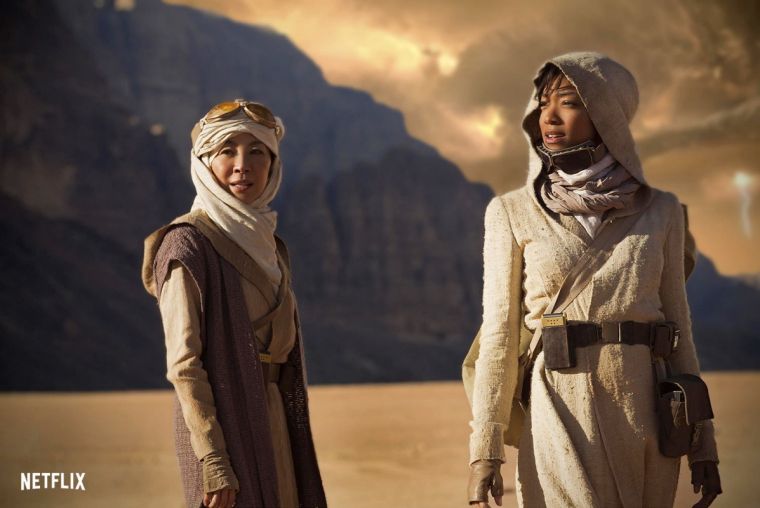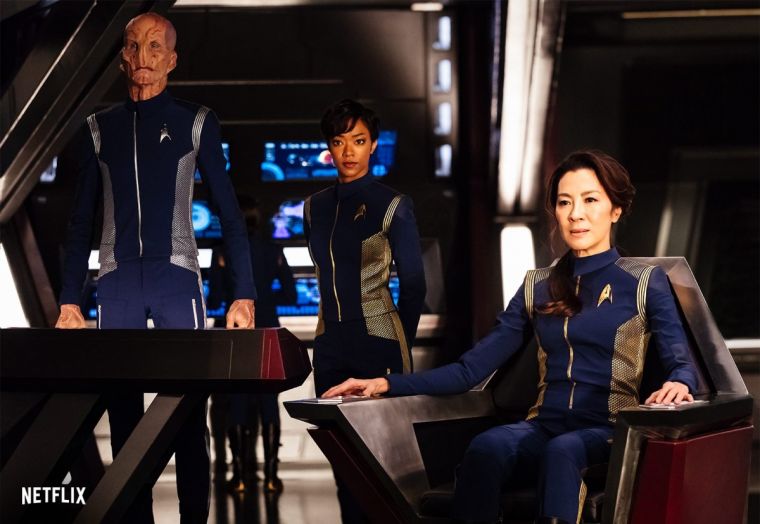Star Trek Discovery: Falling short of the stars in a godless space
This week saw the genesis of a historic rebirth: the return of Star Trek to TV screens. Star Trek: Discovery chronicles once again humanity's optimistic pursuit of the stars in a godless universe, but like previous Trek entries before it, can't help reaching for spiritual themes on its way.
Discovery's bold premiere is a dark, political one that suggests that even if humanity moves on from religion, it might never move on from war.

Star Trek: Discovery airs one year past the original show's 50th anniversary, and 30 years since its beloved follow-up Star Trek: The Next Generation hit TV screens. It's famed for its optimism and confident progressivism in a show centred on humanity's voyage through the heavens. Never to find heaven itself of course, because its atheist creator Gene Rodenberry famously envisaged a utopian future that had transcended religion.
And Discovery's showrunners took this seriously, making clear that even the expression 'for God's sakes' couldn't be used in this strictly secular world. God is dead, and sci-fi killed him.
That writers might want to omit God from their story is no thing for Christians to be upset by; it rather presents an interesting challenge for the story that's told. Is its brave new world, devoid of the divine, one we'd actually want to live in? This is so far a well-made show, but whether intentional or not, Discovery's first two episodes left me with more doom than delight.
'Follow the star,' the show's other-worldly pre-credits introduction invites, seemingly setting optimistic sights for the sci-fi rebirth. In the year 2256 we meet the captain of the USS Shenzhou (we haven't boarded the Discovery yet) played by Michelle Yeoh, partnered with her outspoken and prodigious protégé First Officer Michael Burnham (Sonequa Martin-Green). But the ambitious Burnham, eager for discovery, ends up misstepping on alien property, and sets the stage for all-out war when she kills a member of the militaristic race of the Klingons.
Soon, Starfleet and the Klingons are two superpowers in a mid-space face-off that feels eerily prescient for our own increasingly tense and nuclear-threat-loaded times.
Just as the Bible's first murder (Cain against Abel) imminently followed humankind's fall and spun out into our own tragic history, Discovery also sees a rapid descent. The fresh-faced Michael is not only a killer but soon a mutinous pariah.

Our 'explorer' heroes are torn between fight and flight, but in the end, war is inevitable. And then it only gets darker, with Starfleet meeting devastation with its own cruel tricks (properly called war crimes) to get the upper hand. It's not clear whether the audience should cheer or weep.
The Klingon leader despises Starfleet because they say they 'come in peace' but in his eyes only bring bloodshed, and apparently he has a point. It's a dark step especially this early on the show, but that may be its message.
This futuristic world may have moved on from religion, but it hasn't moved on from war. Humanity might get less godly, but it won't get less flawed. The world appears tragically geared toward violence. In such a crisis, where can hope and deliverance be found?
I'm no Trekkie but I can see that Roddenberry's creation is compelling because it's about what humanity might one day become, for good or ill. It also challenges who we are today. Here's hoping the show pursues nuance amidst the explosions, and doesn't just descend into a noisy sci-fi action blur.
The premiere sees Burnham given the iconic Vulcan benediction to 'live long and prosper'.
But who knew space could be darker than we thought? In this bloody universe, it might not be so easy.
You can follow @JosephHartropp on Twitter
Star Trek: Discovery is airing weekly on Netflix (internatonally); in the US it airs weekly on the CBS All Access subscription service.











